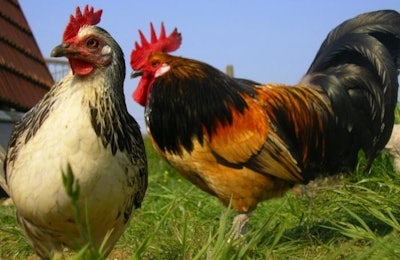
Poultry industry professionals expressed great concern over virulent Newcastle disease (vND) during the 2019 International Production & Processing Expo (IPPE). The outbreak of the disease will mean some flocks will need to be depopulated. In addition, the export of eggs to other states or internationally could be halted.
During the week of February 8-14, the United States Department of Agriculture’s (USDA) Animal and Plant Health Inspection Service (APHIS) confirmed 10 additional cases of virulent Newcastle disease in California's Riverside and San Bernardino counties. In total, there have been more than 375 cases since May 2018.
Spread of disease
“It is difficult to know how the disease spreads in all cases, but it is commonly felt that fomites -- physical carriers of contaminants -- carry the disease agent from one farm to another,” said Eric Gingerich, D.V.M., technical service specialist with Diamond V.
These fomites can be people, equipment, egg handling materials, feed sacks, vehicles, wild animals, or free-flying birds.
“Infected chickens, if added to a flock as is done quite commonly in backyard situations, will spread the disease very readily. The all-in all-out concept prevents the introduction of disease from infected birds,” he said.
Lessons learned
“The industry has learned (from vND) that our biosecurity systems in place on some farms are not capable of preventing the spread of such a disease,” said Gingerich.
It has been suggested that exposure to back yard flocks, unknown by the producer, is at the root of the spread of this disease. “There is no treatment for this disease as it is due to a virus. An increase in mortality above normal and the finding of typical lesions should trigger a producer to get a confirmation of the disease by a diagnostic laboratory,” Gingerich said.
Increased biosecurity
Some producers within the egg industry close to the areas of high risk have ramped up biosecurity measures. These measures include increase sanitation of egg handling materials and greater employee decontamination practices before working in chickens, he explained. “Some have also booster vaccinated their flocks with Newcastle disease vaccine.”















